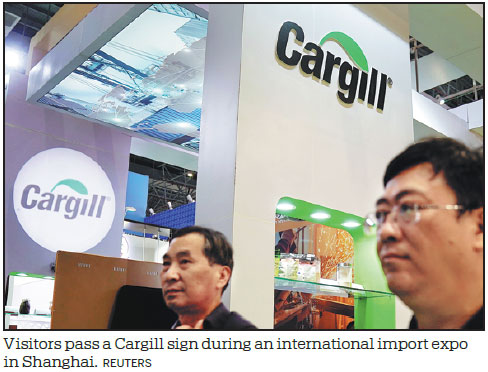Cargill to boost Jilin corn processing unit

Cargill Inc, the US-based agricultural conglomerate, will invest $112 million to expand the capacity of its corn processing facility in Songyuan in northeastern China's Jilin province, its global head said on Monday.
The move is also a part of its joint initiative with the local government to build the Sino-US Cargill Biotech Industrial Park, featuring a food safety and technology center in Jilin, said Dave MacLennan, the group's chairman and CEO.
"China is a crucial market with amazing vitality. We will continue to work as partners with China to build sustainable agriculture and invest in rural areas," said MacLennan, adding that China's multiple measures to diversify the supply of quality products and services will effectively drive its economic growth.

He said Cargill hopes to double its investment in China over the next five years, especially in areas such as poultry, soybean crushing, food ingredients and animal protein production, in addition to bio-industry related business and the training of farmers.
The park is designed to facilitate both corn processing and trading, with an annual processing capacity of up to two million metric tons by 2020. According to its plan, futures warehouses will also be built for commodities such as corn and starches.
Cargill's food safety and technology center will focus on testing, research and training in the area of food safety, as well as process improvement and product development for the corn processing and food ingredient industries.
AIPU Food Industry Co is one of the companies that has established a presence in the park. As one of the key partners of Cargill in China, the Shanghai-based company is constructing a 50,000-ton project to produce caramel pigment, leveraging products and services from Cargill and the park.
"The park welcomes companies along the corn processing and trading value chain," said Liu Jun, president of Cargill China. "They will enjoy convenient services and easy access to resources at the park, including a supply chain to connect their products with the domestic and overseas market."

Attracted by the Chinese market's size and encouraging government policies, the Minnesota-headquartered company invested $40 million last month in Yichun, Jiangxi province, to build an animal nutrition plant with an annual production capacity of 120,000 tons of premix and 60,000 tons per year of specialty animal feed, and in February opened its first beauty care lab and office in Shanghai supporting the Asia-Pacific region.
Foreign direct investment is often a strategy to tackle issues such as logistics solutions, labor and materials cost and trade hurdles, said Guo Xin, a marketing professor at Beijing Technology and Business University.
"The high investment volume certainly indicates the growing demand for various food products such as meat, edible oil, dairy and beverages in the Chinese market," she said.
FDI into China totaled 242.28 billion yuan ($36 billion) in the first quarter of this year, up 6.5 percent year-on-year, the Ministry of Commerce said on Thursday. Investment in China from South Korea, the United States and Germany meanwhile increased 79.6 percent, 71.3 percent and 86.1 percent year-on-year, respectively.
MOST POPULAR
- 1 China to give visa-free treatment to another 9 countries
- 2 China fully opens manufacturing sector to foreign investors in landmark opening up move
- 3 China's import expo attracts record-breaking participating countries, exhibitors
- 4 China's door opening even wider to foreign visitors, businesses
- 5 China revises rules to ease foreign strategic investment in listed firms
Editors' Picks
 Video:
Peru sees new port open
Video:
Peru sees new port open
 Infographic:
China's public holidays for 2025
Infographic:
China's public holidays for 2025
 Infographic:
Basic facts of APEC
Infographic:
Basic facts of APEC
 Infographic:
Wrapping up the 7th CIIE: Data recap
Infographic:
Wrapping up the 7th CIIE: Data recap



